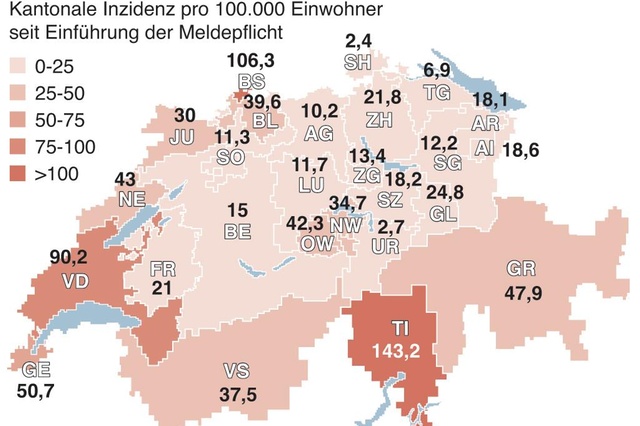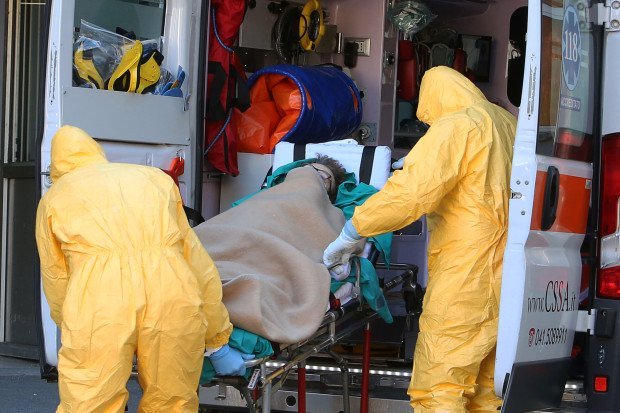Arrin në 33 numri i viktimave nga koronavirus në Zvicër, ndërkohë numri i të infektuarve ka shkuar në 3 888 në Zvicër dhe Liechtenstein.
Rastet janë rritur në mënyrë drastike gjatë ditëve të fundit. Ky numër ka arritur në orët e para të pasdites së sotme në rreth 3,800, ndërsa të mërkurën kishte ende rreth 3000 raste.
Sipas rekomandimit të udhëheqësit për sëmundjet ngjitëse në kuadrin e BAG, Daniel Koch, njerëzit tani duhet të qëndrojnë në shtëpitë e tyre dhe të shmangin kontaktet sociale. Ai thotë se e gjithë popullata e vendit ka përgjegjësi për të zbatuar masat e ndërmarra nga shteti dhe të jetë bartëse e tyre.

(Keystone)
Why Switzerland struggles to keep track of coronavirus cases
As our readers may have noticed, when it comes to tracking cases of Covid-19 in Switzerland, the numbers do not always add up. A fast-changing situation and counting methods that vary at the federal and cantonal levels account for some of the discrepancy.
If you take the latest tally from the Federal Office of Public Health, the pandemic that has wreaked havoc across the world has claimed 33 lives in the landlocked nation. Media conglomerate Tamedia, which has a dedicated team aggregating cantonal data, counts 35. The gap between these two figures can be significantly larger within a single 24-hour period.
“We do not intend to conceal anything,” Daniel Koch, head of communicable diseases at the public health office, told reporters this week when asked about the discrepancies. “We will publish the detailed figures as quickly as possible.”
The variation in numbers reflects the speed at which the situation is changing in Switzerland and is perhaps an inevitable consequence of a federal system of government in which national and cantonal authorities have embraced different counting methods. For now, the government issues an updated tally only once a day, based on information sent by the cantons in the morning. Koch admits it is a challenge to keep the numbers up to date.
“At the moment the numbers are increasing so quickly that we also have trouble entering all the data in order to be able to carry out the analyses,” Koch told journalists on Tuesday, stressing that the authorities were not trying to hide or withhold information.
Outdated methods
The government’s struggle to get a grip on the data is also a byproduct of outdated methods. Cantons flag new cases on forms that they fill out and fax to the central government, as Swiss public television SRF notes. external link Federal authorities wait for cases to be confirmed by the reference lab in Geneva before updating their numbers, while some cantons report on suspected cases with or without such confirmation.
With Europe replacing China as the epicenter of the epidemic, the Swiss government has also come under criticism for not embracing a more aggressive testing strategy early on. Bern rejects the criticism and says tests are being carried out at maximum capacity, although screenings are limited to those at risk showing severe symptoms and health workers. If you factor population size, Switzerland tests at about the same pace as South Korea, which has been touted as a success case in its handling of the pandemic.
Beginning of the wave
“This is only the beginning of the wave,” warned Koch. “The number of cases will increase and we must do everything to smooth it out and avoid overloading hospitals.”
Data experts in Switzerland have been flagging the steep increase in the number of cases, which is doubling every three days.
“The numbers are subject to big variations from day to day,” says Antoine Flahault, director of the Institute of Global Health at the University of Geneva, “because we are in an exponential growth phase, but also depending on the methods of measurement or data collection.” Flahault is documenting daily the progression of Covid-19 in several countries, including Switzerland.
He forecasts Switzerland will have nearly 7,000 confirmed cases by March 24.
Mar 18 Epidemic Forecasting for France, assuming same pace at exponential growth as the last 2 days (x1.4), up to 1 week ahead:
9,134 confirmed cases by March 18
12,788 foreseen by March 20-21
17,903 foreseen by March 22-23
25,064 foreseen by March 24-25— Antoine FLAHAULT (@FLAHAULT) March 18, 2020
The mortality rate remains low, especially relative to neighbouring Italy, which has been particularly hard hit on account of its sizeable elderly population and a healthcare system that endured more than a decade of austerity measures.
Unlike other countries, Switzerland has not provided information on the number of people in intensive care or the extent of capacity in hospitals, French-language newspaper Le Tempsexternal link notes in a report on the issue.
+ Rapid spread of coronavirus complicates systematic testing
Thirty laboratories carry out diagnostics across the country. In the absence of a unified national strategy, some cantons are trying to speed up the process by rolling out rapid test centres and mobile teams to check people who are suspected of having the virus. Vaud and Zurich have overtaken Ticino as the cantons with the most reported cases. It remains to be seen whether the spike in cases in these two places is a result of more aggressive testing.

















